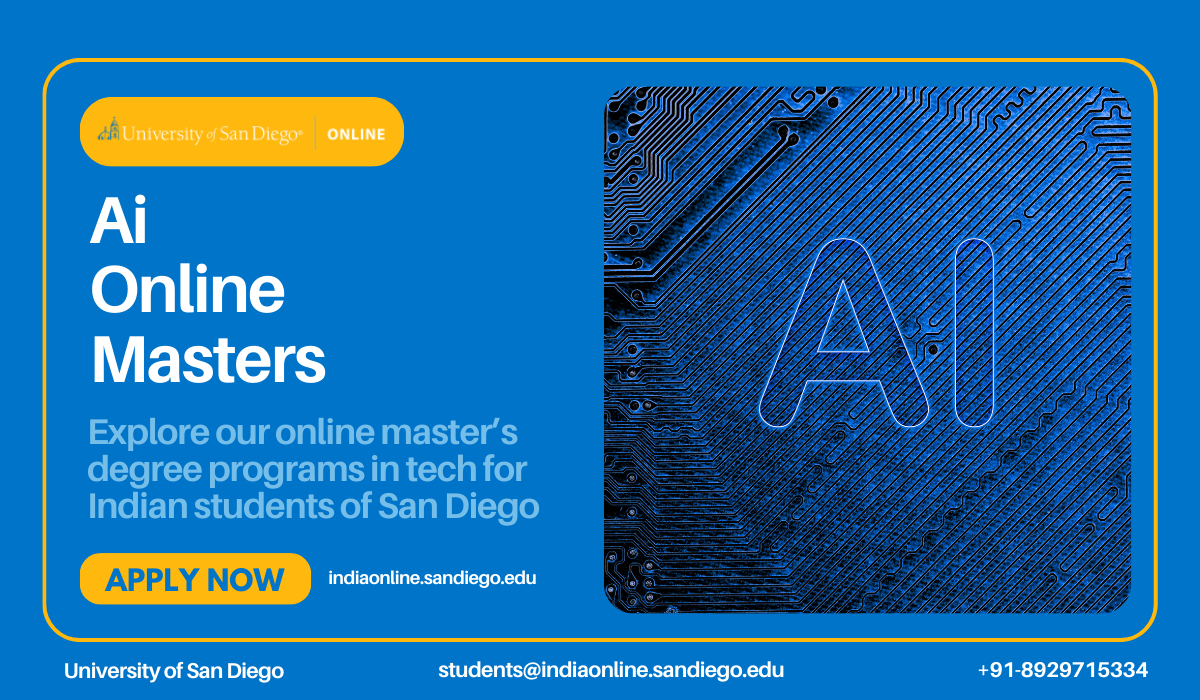Tips for Studying AI Online Masters: Best Resources & Tools

This blog serves as a one-stop guide for Indian students trying to pursue the AI online masters, showing all the resources, tools, and strategies that have been proven useful. It mentions many online learning platforms like Coursera and NPTEL, open source libraries of TensorFlow and PyTorch, as well as coding platforms such as Kaggle. The blog also discusses the necessary career options, the salary to expect, and critical considerations for an appropriate AI program – like accreditation and flexibility. Finally, it responds to the popular FAQ topics about prerequisite qualifications, expected duration, career pathways, and the recognition of pursuing an AI degree online from India.
Why Pursue an AI Online Masters Degree?
Artificial Intelligence (AI) is changing industries across the globe. There has been a sudden surge in the adoption of AI in India and the adoption of AI is expected to grow at a value of $7.8 billion by 2025. For many professionals wishing to advance their AI skills, multiple options offer convenience and flexible learning schedules. The online masters degree program offers working professionals and students a chance to attain mastery without having to change their daily routines.
Best Resources & Tools for Masters in AI Programs
The best masters in AI programs require students to possess unique resources. The right technologies can improve learning and facilitate better comprehension. Here are some of the valuable resources that are available to learners in India:
1. Online Courses: Many platforms provide several AI courses offered by elite universities and prominent industry figures.
- Coursera is yet another platform offering AI courses from Stanford, MIT, and Google Cloud.
- edX – Offers free access to Harvard, Columbia, and Microsoft’s well-structured AI Programs.
- Udacity’s nano-degree programs are centered around AI applications.
- NPTEL (National Programme on Technology Enhanced Learning) is a government initiative that offers AI and machine learning courses through IITs.
These platforms enable learners to undertake organized courses at their own pace.
2. Machine Learning Libraries: Work experience is a prerequisite for competent AI students. Below are some of the libraries that can allow the implementation of robust AI models:
- TensorFlow is Google’s deep learning open-source framework.
- PyTorch is a framework that integrates production and research AI model-focused architectures.
- Scikit-learn is a framework that implements traditional machine learning algorithms.
- Keras is a higher-level Python neural network API that is used for simplified neural network trAIning and testing.
With the help of these libraries, students can develop solutions for AI-related issues while improving their problem-solving competencies.
3. AI Competitions and Coding Websites: Hands-on coding allows students to relate to AI concepts practically in real life.
- Kaggle – One-stop access point for AI competitions and datasets.
- HackerRank – Provides coding challenges with an AI focus.
- Google Colab – A platform that offers free cloud-based execution of AI models.
Such platforms enable students to practice coding using real datasets.
4. Research Papers and AI Publications: Reading research papers enables students to keep track of the advancements in AI.
- arXiv – An open-access library for AI research papers.
- Google Scholar- Provides access to publications on AI from various universities around the world.
- IEEE Xplore- Provides access to journals and conference proceedings on AI.
Having access to such papers enables the development of advanced analytical skills and profound knowledge of AI.
5. Online Communities & Forums: Forums help to clear up doubts and offer networking opportunities.
- Reddit- Conversation around trending AI topics.
- Stack Overflow – Answers to programming queries on AI.
- GitHub – Collaborative platform for open-source AI projects.
These forums facilitate learning through interaction with peers.
How to Choose the Best Masters in AI Program?
It’s important to choose the right AI program. Some of the key things to look out for include:
- Accreditation – Check that the program is accredited by relevant authorities.
- Curriculum – Make sure it includes deep learning, NLP, and ethics of AI.
- Flexibility – Find self-paced or part-time opportunities.
- Industry Connections – Tie up programs with industries for better job prospects.
An MS in Applied Artificial Intelligence from USD Online is one of the programs that has a balanced focus on the well-rounded curriculum for AI enthusiasts.
Final Thoughts
Indian students can pursue an AI online masters to gain specialized training and advance their careers in one of the world’s fastest-growing industries. With the proper guidance, practical knowledge, and organized study schedule, students can learn to master AI and contribute significantly to this field. Proper program selection, discipline, participation in AI forums, and community activities in AI clubs will open doors for success in the profession, ensuring career growth.
FAQs-
1. What are the prerequisites for a masters in AI?
Candidates must possess knowledge of mathematics, programming (Python), and statistics.
2. How long does it take to complete a masters in AI?
Depending on the program’s structure and study pace, most programs range from 12 to 24 months.
3. Are online AI degrees valued in India?
Yes, many renowned universities offer online degrees in AI, which are appreciated by employers.
4. Which careers can one pursue after earning a masters in AI?
Professionals may secure positions such as AI Engineers, Data Scientists, Research Analysts, or Consultants across multiple industries.







